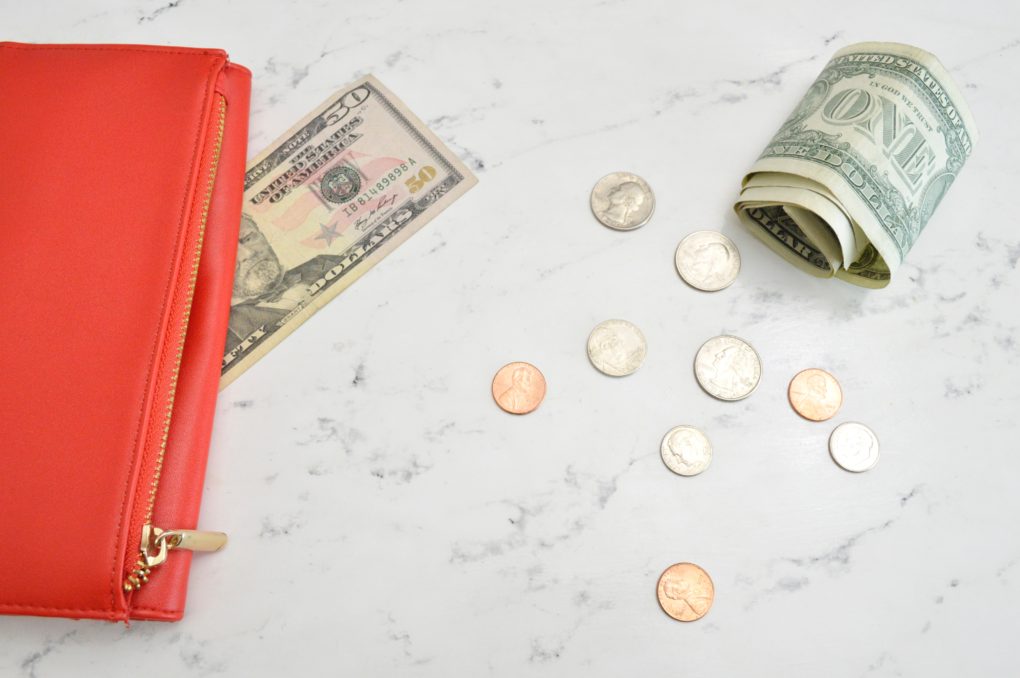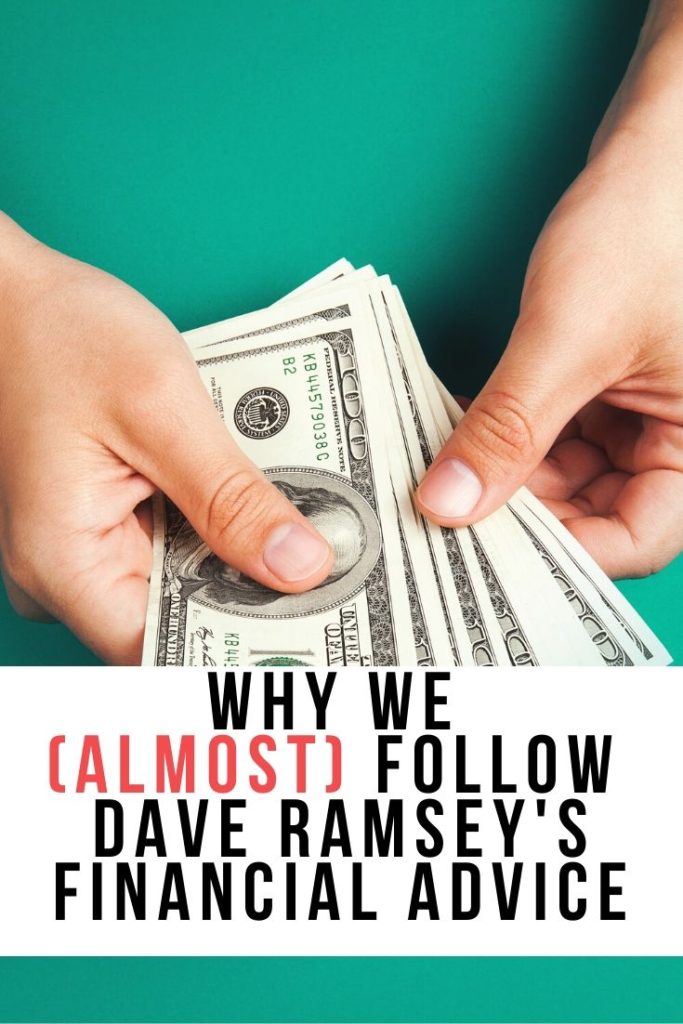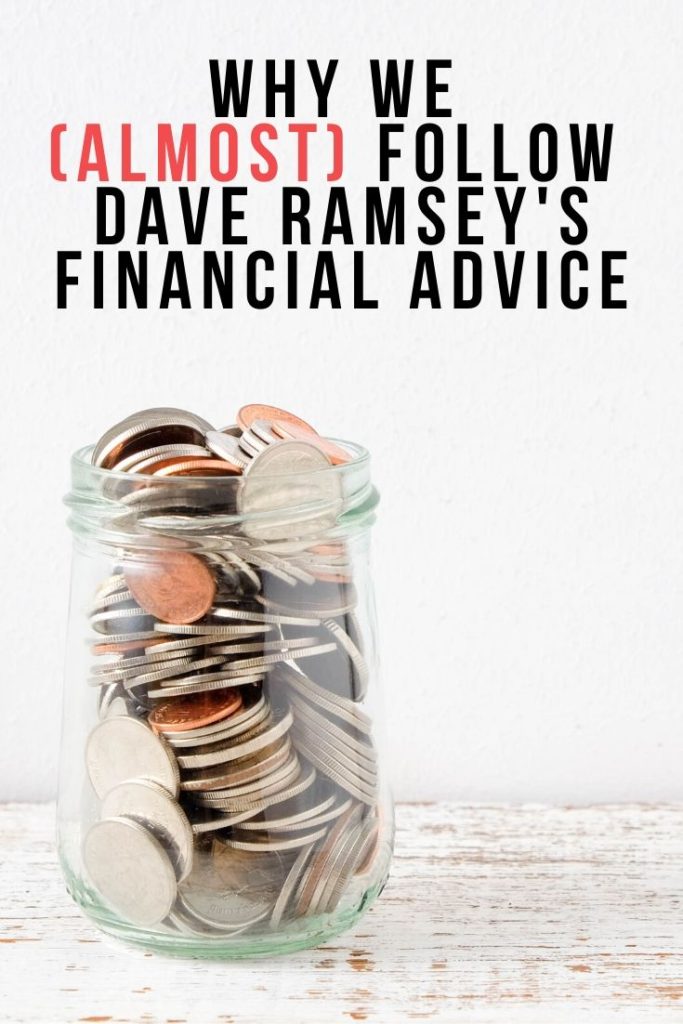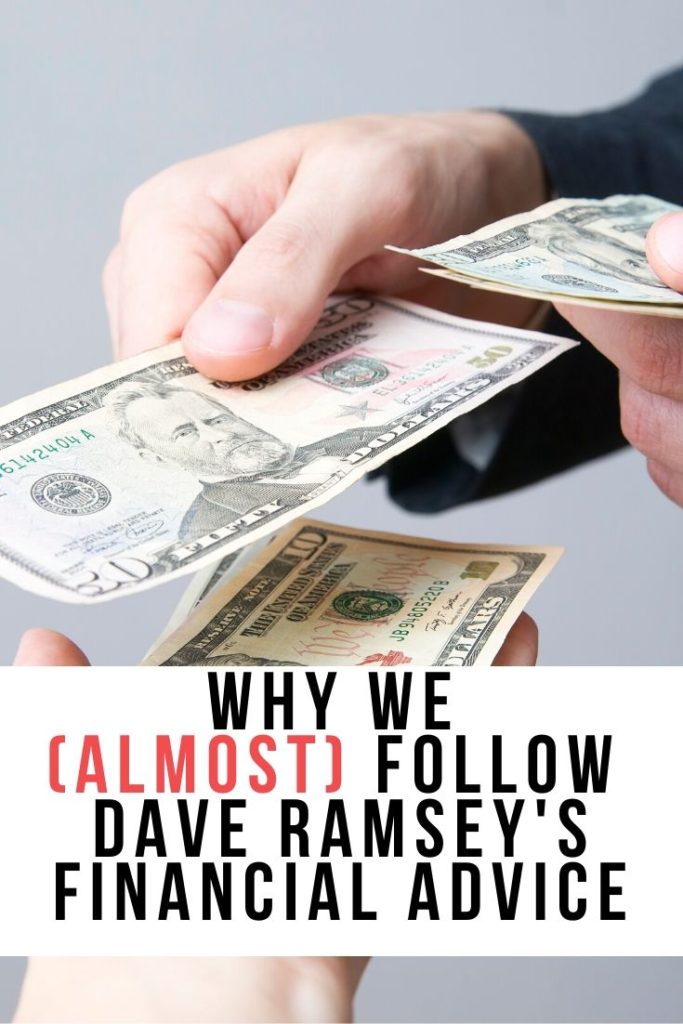Why We (Almost) Follow Dave Ramsey’s Financial Advice

If you need help getting your financial house in order, look no further than Dave Ramsey. Dave Ramsey, most popular for his “debt snowball” strategy (which we will go into later), is a personal money management expert who also hosts a radio show heard by 14 million listeners each week on more than 600 radio stations.
No matter how big your financial obstacles may seem, Dave Ramsey’s financial advice teaches how to build wealth, get out of debt, and achieve financial freedom. We highly recommend his book, Total Money Makeover, if you’re just starting out on your journey to financial freedom.
With the mounting costs of college tuition and living expenses, a majority of newly married couples are entering into marriage already in debt. That’s why it’s so important to talk to your spouse about money goals and planning a budget together, or you could end up committing infidelity.
Wait a minute…who said anything about cheating on your spouse? I thought we were talking about money?
Not sexual infidelity, but financial infidelity, which can be just as dangerous to a marriage as the former. Financial infidelity happens when one spouse hides purchases from the other because they don’t think the other spouse would “approve” of their purchase. When the other spouse finds out about the purchase, trust is broken down in the relationship, just like with sexual infidelity.
We believe in having one shared checking account, which forces us to make our financial decisions as a unit, not an individual. Ramsey believes in this as well and likens it to when the preacher says “and now you are one” at your wedding. It forces you to communicate and agree on your financial goals.
So, you may wonder why we almost follow Dave Ramsey’s advice instead of whole heartedly following his advice. Let me point out a few of Ramsey’s financial principles that we totally adhere to:
- Have an Emergency Fund – Ramsey suggests you have at least $1,000 saved up in an emergency fund. We take this a bit further and have more than $1,000 saved up because in the past, we have dealt with both air conditioning units breaking within 6 months of one another and we don’t want to be in that situation again.
- Have 3-6 Months of Expenses in Savings – We have enough saved that if one of us were to lose their job, we would be able to comfortably live a few months.
- Invest 15% of household income into Roth IRAs and Pre-Tax Retirement – We also subscribe to this but again take it a step further and have maxed out contributions to our Roth IRAs.
- Pay Off Home Early – Now, this one kind of goes both ways because Dave Ramsey recommends you pay off all your debt before you buy a house. We didn’t do this, we still had car payments and student loan debt. However, we did buy below our means and after the car payments and student loan debt was gone, we refinanced to a 15 year mortgage.
- The Debt Snowball – This method is how we paid off all of our debt and we are on track to pay off our last debt, our mortgage, in the next few years. Basically, you take your smallest debt (for us it was car payments) and pay those off first and then move onto your next highest debt (student loans for us) and take what you were paying on your car payment and use it towards your student loan payment until that is paid off. Lastly, you tackle your biggest debt (our mortgage for us) by adding into your mortgage payment the dollar amount of the car payment and dollar amount of the student loan payment. You will be amazed how quickly you start paying off debt!
- Giving – Lastly, after you have invested, saved, paid off your mortgage, Ramsey makes a strong call to action to giving a portion of your wealth away. He points out that money and wealth won’t make you happy, but having a personal relationship with Christ and giving will make you more rich than all the money in the world.
Now let me move onto some of Ramsey’s principles that we DO NOT follow:
- Cut Up All Credit Cards – Ramsey hates credit cards and he makes that abundantly apparent when he talks about them. We can see why, credit card debt is a huge problem in America! However, if you are financially responsible and can pay off your credit card bill every month, there’s no reason not to have a credit card and be able to reap the benefits from credit card rewards. For instance, we have several travel credit cards, we charge all of our monthly expenses to these credit cards and pay off the balance every month. In doing so, we have racked up so many airline miles that we haven’t paid cash for a flight in years!
- Using Cash Envelopes – Since we charge all of our monthly expenses to our rewards credit cards, we don’t subscribe to the cash envelopes principle. We have a very detailed budget that we follow and don’t feel like it’s necessary for us to use cash envelopes. Now, if we were in a situation where our spending was out of control in a category like eating out or entertainment, than yes, we would definitely use cash envelopes to reign ourselves back in!
- Waiting to Invest Until Debts Are Paid Off – One of our main goals is to retire early so we definitely did not wait to invest into retirement plans before our debts were paid off. Of course, now that all of our debts are paid off except our mortgage, we can invest much more in those investment accounts but we never stopped investing while paying off debt.
So what is Ramsey’s biggest takeaway to get you out of debt and on your way to financial freedom? SAVE! That doesn’t mean that Ramen has to become the biggest staple in your diet (we would be up a creek if that were the case since we follow a Paleo lifestyle), but it simply means do more with less. In other words, live frugally! You can read here about all the ways we have chosen to live frugally and save thousands.
It also means be deliberate with your spending, don’t buy what you don’t need, and save the rest for future large purchases – wouldn’t you love to buy your next new to you-used car without having to finance it? (Afterall, Dave teaches us never to buy new!)
If you are just starting out on your journey to financial freedom, Dave Ramsey’s financial plans and principles are a great start. However, the most important thing is to come up with a plan that fits your family’s ultimate financial goals. I’m sure you will find it will be some sort of hybrid plan with principles from Suze Orman, Mr. Money Mustache, or Dave Ramsey.
If you liked this post, save it for later on Pinterest!




